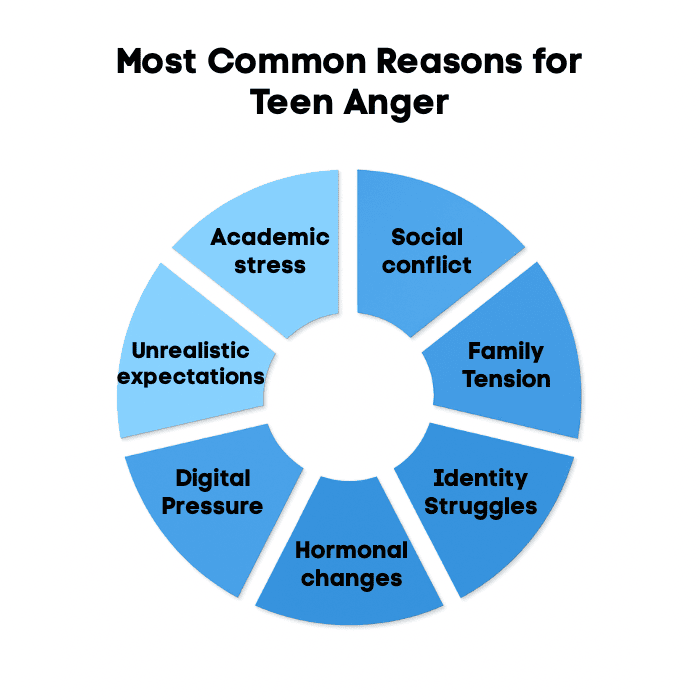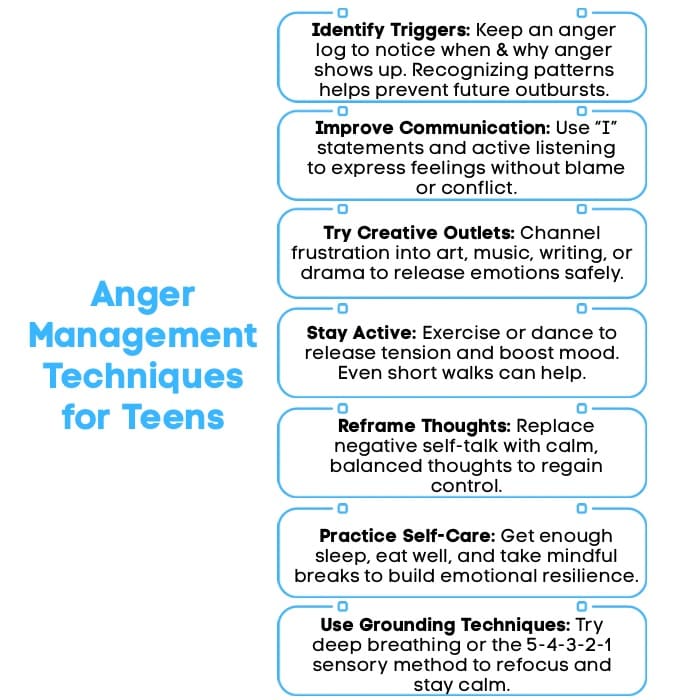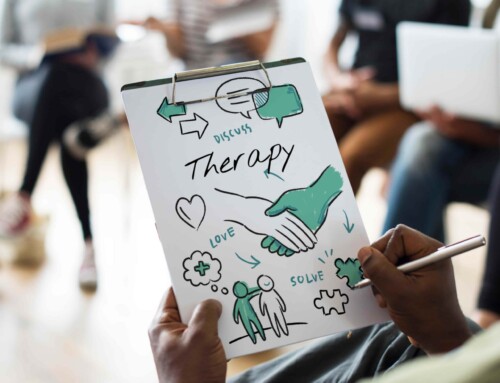What Are the Best Anger Management Techniques for Teens?
Key Highlights
- Teen anger often stems from stress, identity struggles, and emotional overwhelm.
- Recognizing early signs of anger helps prevent outbursts and promotes calm.
- Understanding the stages of anger allows teens to pause before reacting.
- Practical anger management techniques teach emotional control and self-awareness.
- Healthy coping habits like exercise, journaling, and deep breathing reduce tension.
- Support from family members plays a vital role in building emotional resilience.
- Professional help, such as therapy or anger management programs for teens, can guide lasting change.
- With patience and empathy, anger can transform into confidence and emotional growth.
You’ve probably seen it before: the slammed door, the sharp tone, or the heavy silence that fills the room. Moments like these can leave parents feeling helpless, wondering what’s really going on beneath their teen’s anger.
The truth is, teen anger often hides other emotions like stress, sadness, or the fear of not being understood. Between school pressure, social media, and the need to fit in, it’s easy for emotions to build until they overflow. When that happens, anger can become a way to cope, even though it often causes more harm than relief.
But anger isn’t the enemy. With patience, empathy, and the right anger management techniques for teens, those heated moments can become chances to connect and grow. This blog explores what teen anger looks like, why it happens, and how to guide teens toward calmer, more confident emotional control.
What Does Teen Anger Look Like?
Teen anger can show up in many different ways, like loud outbursts, cold silence, or even a sarcastic comment that stings. During these years, emotions often feel bigger and harder to control because the part of the brain that helps with decision-making and impulse control is still developing. That’s why it can be tough for teens to pause and think before reacting.
Sometimes anger comes from feeling unheard, pressured, or treated unfairly. It can also show up physically, such as a racing heart, clenched fists, or tight muscles, when frustration builds. Behaviorally, it might look like yelling during an argument, slamming a door after being told “no,” or pulling away from friends and family.
It’s completely normal for teens to feel frustrated, but when those moments turn into frequent blowups, aggression, or constant withdrawal, it may signal deeper struggles. For example, if your teen often snaps after a rough day and shuts down afterward, it could mean they need better ways to release what they’re feeling.
Recognizing these patterns early helps you create a space where your teen feels safe expressing anger and learning to manage it in healthier, more constructive ways.
What Are the Most Common Reasons for Teen Anger?

Teen anger often comes from a mix of pressures and emotions that feel overwhelming to handle all at once. Understanding what triggers these feelings is the first step toward helping teens respond in healthier ways. Here are some of the most common causes:
- Academic stress: Late nights, heavy homework, and pressure to perform can make teens feel like they’re constantly racing to meet expectations. When every test feels like a reflection of their worth, motivation can quickly turn into frustration and self-doubt.
- Social conflict: Friendship drama, being left out, or feeling ignored can deeply hurt. Teens crave connection, so rejection or gossip often leads to emotional outbursts or withdrawal as they try to protect themselves from feeling unwanted.
- Family tension: Disagreements over rules, chores, or independence can leave teens feeling unheard or misunderstood. When communication at home breaks down, it adds to daily stress and makes anger more likely to surface.
- Identity struggles: Trying to figure out who they are and where they belong can feel confusing and lonely. When teens feel lost or unsure about themselves, that internal tension can easily show up as irritability or anger.
- Hormonal changes: Shifting hormones can amplify emotions and make reactions feel more intense than expected. A small setback might suddenly feel overwhelming, making it harder for teens to stay calm in the moment.
- Digital pressure: Social media comparisons and online criticism can quietly wear down confidence. When teens feel they can’t measure up to what they see online, it often leads to feelings of anger, insecurity, or isolation.
- Unrealistic expectations: High standards from parents, teachers, or themselves can create constant pressure to be perfect. When they fall short, that disappointment can turn into resentment, frustration, or self-blame.
Recognizing these triggers helps parents and teens work together to manage anger before it escalates. By understanding the root causes, it becomes easier to teach healthy coping skills and guide teens toward calm, confident emotional control.
If your teen’s anger seems rooted in deeper insecurities, working with a counselor can make a real difference. Our Orlando-based team offers practical guidance to help build self-esteem, confidence, and support emotional growth in everyday life.
What Are the Different Stages of Anger in Teens?
Anger rarely comes out of nowhere; it usually builds step by step. When teens understand these stages, they can spot what’s happening inside them and take action before emotions spiral.
Here’s what the stages of teen anger typically look like:
- Trigger: Something happens that sparks irritation or frustration; maybe a harsh comment, a bad grade, or feeling dismissed.
- Build-Up: The body reacts with tension, faster breathing, or defensive thoughts. This is the moment to pause, breathe deeply, or take a short break.
- Explosion: The peak of anger, often shown through yelling, arguing, or shutting down completely. It’s powerful but usually brief.
- Cooling Down: Energy fades, and feelings like regret or sadness may appear as the body relaxes.
- Reflection: Teens think about what caused their anger and what they could do differently next time.
Recognizing these stages helps teens interrupt the anger cycle and choose calmer responses before things escalate. Over time, this awareness builds stronger emotional control and better coping skills.
Wondering if your teen’s anger is normal or something more? Read our guide on spotting the key warning signs of ODD in teens.
Anger Management Techniques for Teens

Managing anger is not about suppressing it; it’s about learning to respond in a calm, healthy way. With the right tools, teens can recognize their emotions, express them constructively, and recover more quickly from stressful moments. Here are a few proven anger management strategies for teens that can make a lasting difference:
1. Identify Triggers and Emotional Patterns
Keeping track of when and why anger shows up can be incredibly helpful. Encourage teens to use an anger log or journal to write about moments of frustration. Over time, they’ll start to recognize recurring situations or people that trigger their anger. This awareness helps teens understand their emotions better and makes it easier to stay calm the next time they feel upset.
2. Improve Communication Skills
Healthy communication can stop anger from building up. Teach teens to use “I” statements, such as “I feel upset when plans change suddenly”, instead of blaming others. Encourage active listening and honest, open communication to reduce tension and avoid misunderstandings before they turn into conflicts.
3. Try Creative Outlets for Expression
Creative anger management activities for teens can turn anger into something productive. Writing, painting, music, or acting allows teens to express emotions safely and freely. For example, sketching or journaling after a tough day can help them process frustration while improving self-awareness.
4. Use Physical Activity as an Outlet
Exercise is one of the most effective ways to release built-up energy and stress. Running, dancing, or swimming helps calm the mind while improving mood and focus. Even a short walk can reset emotions and encourage healthier ways of handling anger.
5. Reframe Negative or Automatic Thoughts
Anger often grows from negative self-talk like “no one listens to me” or “this always happens.” Help teens challenge those thoughts and replace them with positive ones, such as “I can explain how I feel” or “this moment will pass.” This cognitive shift encourages better impulse control and emotional balance.
6. Practice Self-Care and Resilience-Building Habits
Small lifestyle choices can have a big impact on mood. Encourage good sleep, balanced meals, hydration, and mindfulness to build emotional resilience. Simple activities like spending time outdoors, reading, or listening to music can help teens unwind and stay centered.
7. Use Grounding or Distraction Techniques
When anger starts rising, grounding methods can bring focus back to the present. The 5-4-3-2-1 technique (naming five things to see, four to touch, three to hear, two to smell, and one to taste) helps calm the mind quickly. Deep breathing or visualizing a peaceful place can also stop anger from escalating.
Every teen feels angry at times; it’s part of growing and learning who they are. With patience, practice, and the right tools, anger can become less about losing control and more about gaining understanding.
Want more support? Check out these 5 expert parenting tips on guiding angry teens without losing connection.
When Are Anger Management Techniques Not Enough?
There are times when anger feels too heavy to handle alone, even with the best strategies in place. If a teen is having frequent outbursts, showing aggression, or turning that anger inward through self-destructive behavior, it may be a sign that they need extra support. When anger starts to interfere with school, friendships, or family life, reaching out for professional help can make a big difference.
Therapies like cognitive behavioral therapy, dialectical behavior therapy, or group therapy give teens a safe space to understand what’s driving their emotions and learn healthier ways to respond. These approaches help strengthen emotional regulation and build lasting coping skills.
Parents and caregivers can play a vital role in influencing teens by staying patient, offering reassurance, and reminding teens that asking for help is a sign of strength, not weakness. With compassion, guidance, and the right support, every teen can find their way to calmer, more confident emotional control.
Wondering how to guide your teen’s emotions with more confidence and care? Explore 3 expert-backed tips from our Orlando counselor to positively influence your teen and strengthen your parent–teen connection.
Finding the Right Support with TLC’s Teen Anger Group Counseling Therapy
If anger is starting to take a toll on your teen’s life, know that help is available, and it can make a world of difference. At Total Life Counseling, the Teen Anger Group Counseling Therapy program gives teens a safe and supportive space to understand their emotions, identify triggers, and learn healthy ways to respond.
Led by experienced counselors, this short three-week program combines guidance, group discussion, and practical tools that teach teens how to express anger confidently without losing control. Each session helps participants build self-awareness, improve communication, and strengthen emotional resilience, skills they can carry into every part of their lives.
Classes are held weekly at TLC’s Metro West location, both welcoming and structured to make learning engaging. Teens who complete the program receive a certificate of completion, a reminder of how far they’ve come in managing their emotions.
Book a free 15-minute consultation to learn more about how this program can help your teen start feeling calmer, more confident, and in control.
Finding Calm Beyond the Anger
Anger is a normal part of growing up, but when it turns into uncontrolled anger, it can affect a teen’s mental health and relationships. Recognizing the signs of anger, whether it’s tense muscles, clenched fists, or sharp words, is the first step toward better control. Every teen’s anger has a cause, and understanding it helps replace frustration with clarity.
With the right coping strategies, managing anger for teens can be healthy and productive. Learning effective anger management helps teens handle intense emotions and avoid unhealthy ways of expressing frustration. Building strong anger management skills gives them the tools to express feelings of anger calmly and confidently.
Sometimes, joining anger management classes for teens or seeking guidance can make a real difference for both teens and family members. Managing anger is not about suppressing emotions but turning intense feelings into understanding, growth, and balance.
Frequently Asked Questions
What are the most effective anger management techniques specifically for teenagers?
The most effective techniques focus on building emotional regulation skills, improving self-awareness, and practicing positive anger management skills. Teens benefit from journaling, deep breathing, and learning to identify triggers early, which helps prevent unmanaged anger and encourages calm, thoughtful responses.
How to deal with a young teenager with anger issues?
Start by creating a safe space where an angry teenager can express feelings openly. Encourage effective communication and guide them toward healthy coping mechanisms like exercise or creative outlets. You can also encourage them to be a part of anger management group activities for teens. Patience and empathy play a significant role in helping teens manage their anger constructively.
How can unresolved anger affect a teenager’s mental health?
When anger remains unresolved, it can lead to harmful behaviors and increase the risk of developing an underlying mental health condition. Over time, unmanaged anger may cause stress, strain relationships, and negatively impact overall emotional growth and confidence.
How is teen anger different from adult anger, and why are unique techniques needed?
Teen anger often feels more intense because of developing brains and limited control over their own emotions. Unlike adults, teens may not recognize physical signs of anger early, so they need tailored approaches that focus on self-awareness and healthy anger management.
How can parents support their teen in managing anger at home?
Parents can play a significant role by modeling calm behavior and promoting open discussions about emotions. Encourage participation in anger management programs for teens or use at-home strategies that build effective anger management skills while supporting emotional growth and mental health disorder prevention.
What are some simple anger management techniques to teach teens?
Encourage teens to take deep breaths, count to ten, or step away when emotions rise. Journaling, exercise, and creative outlets like music or art can also help them express feelings in healthy ways and calm down before reacting.
How can I find effective counseling for anger management for teens near me?
Start by searching for local counseling centers, teen therapy programs, or community workshops that specialize in anger management. Look for licensed therapists who work with adolescents and offer personalized strategies to help teens manage emotions and build confidence.
Share This Story, Choose Your Platform!
Total Life Counseling Center consists of Licensed Counselors, masters level therapists, Español counselors, Licensed Mental Health Counselors, business coaches, and image enhancement coaches who provide counseling for emotional, mental, physical and spiritual care including marriage, individual, family, substance abuse and more. TLC’s family, trauma and marriage experts have been interviewed on National and Local TV/Radio over 200 times for their expert advice on Fox News, OWN, WETV, ABC’s Medical Minute and more. Our skilled counselors are relational, approachable and specialists providing therapy services in the Central Florida area including: Orlando, Winter Park, MetroWest, Windermere, Dr. Phillips, East Orlando, Lake Mary, and Clermont, Boca Raton Florida, and Dallas, TX.






